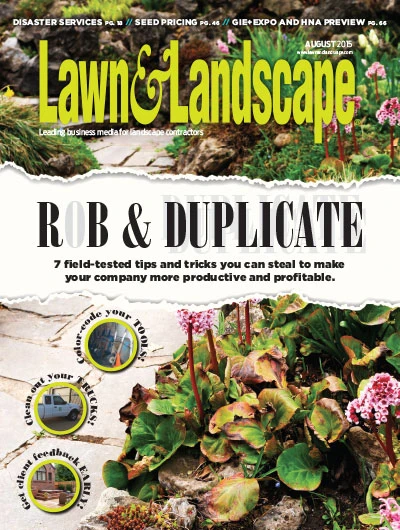Ask the Experts
Grow safely
 Q: I have a written safety program, but my company is growing and adding more services and employees. What are the most effective safety training methods?
Q: I have a written safety program, but my company is growing and adding more services and employees. What are the most effective safety training methods?
A: Safe work practices are vitally important in our industry, and following safety training methods or techniques will strengthen and improve your safety program. Most companies hold regular safety meetings or tailgate safety sessions. This puts the company’s focus squarely on employee safety. Landscaping includes many services, each with safety concerns, so a full-service company must safely train employees on a variety of equipment and work situations.
Landscape construction jobs, for example, require large equipment that can be working in the same work area as other crew members. Cross training safety is a good practice because employees may be assigned different jobs using different equipment in the course of completing the project. Companies that cross train employees on safe equipment operation have more versatile, productive employees and fewer job-related accidents.
New employees must be safety trained before they are job trained, so the first meeting a new employee has should be with the safety director. Doing so emphasizes safety from day one. The company should never assume new employees know safe operating practices just because they have industry experience. Any employee cited for unsafe practices must be written up and instructed in safe operating practices. Repeat offenders should be discharged before a preventable accident happens.
The fleet manager is responsible for maintaining not only the mechanical parts of equipment, but also, and more importantly, the safety mechanisms that keep both the operator and the other crew members safe on the job. The best technique to ensure safe equipment operation is a daily inspection and regular communication about equipment safety issues between operators and the fleet manager.
All employees must be involved in the company’s safety program and understand how important safety is in the operation of the business. All departments should be engaged in the company’s safety program, and training must be ongoing with regularly scheduled sessions. Owners, safety directors, fleet managers, foremen and crew members, even executives and salespeople, have an important role in safe company operations.
Rick Cuddihe, Landscape Industry Certified
LaFayette Property Maintenance
Trailblazer, NALP
Ask the Experts is brought to you in partnership with NALP, the national association of landscape professionals. Questions are fielded through NALP’s Trailblazers, the industry’s leading company mentoring program. For more questions visit Landscapeprofessionals.org.
Letter to the editor
Reader takes action
What a wonderful job you did on the article (“A place to breathe,” June 2015) about George Mark Children’s House. Captured the spirit of this amazing place in one page!!! I know for a fact that your article generated one donation to George Mark from a reader. I hope that many more people are inspired to donate or learn more about GMCH. Our “green industry” is full of wonderful people, so I wouldn’t be surprised!!!
– Sharon Serpico Hanson, president/CEO, Serpico Landscaping
A great 12 months
I own a small landscape company in Ogden, Utah. We have subscribed to your magazine for the last year and I want to personally thank you for the great information you provide to us. It is absolutely invaluable and has been our industry lifeline in starting my company. Whenever I have a question you guys seem to publish a story talking about exactly what I need. Thank you so much for all you do.
– Landon Buhler, owner, Buhler Landscape
Drop what you’re doing
I wanted to drop a quick line to thank you for that interesting article (“54 questions that have absolutely nothing to do with mowers,” March 2015). I haven't had an article grab my attention like that for a long time. It is great to see what the rest of us landscapers are up to across the country.
– Bart L. Poulin, director of operations, Greener Horizon
Smart your engine
 Next month, we’ll be bringing you a package of information on how contractors and LCOs are managing their small engines from maintenance to repairs to replacements. Our Smart Engine Management Month coverage, sponsored by Kawasaki, will include:
Next month, we’ll be bringing you a package of information on how contractors and LCOs are managing their small engines from maintenance to repairs to replacements. Our Smart Engine Management Month coverage, sponsored by Kawasaki, will include:
- Best practices for keeping mowers running at their best, including tracking needed maintenance and making repairs.
- Considerations contractors take when purchasing new engines for mowers and how they make the decision to get rid of an old engine.
- How contractors get around the challenges of replacing engines, where they get them and how they use them.
- Exclusive research on how long contractors keep their engines, their preferred horsepower, their mechanic staffing and their thoughts on after-market parts.
Plus, keep an eye on Lawn & Landscape’s and Kawasaki’s Twitter and Facebook accounts for a full month of engine management tips.

Explore the August 2015 Issue
Check out more from this issue and find your next story to read.
Latest from Lawn & Landscape
- It's not too late to register
- Landscape Workshop acquires Tampa's A-Stellar Property Maintenance and Landscaping
- “You’re literally building the roadmap.”
- Husqvarna debuts 590BTS and 590BFS backpack blowers
- Kress showcases its automower Cut N Go
- Kress releases new autonomous mower details
- Landscape Workshop acquires EdgeForm Landscape Management
- Caterpillar's Umpleby transitions to executive chairman





